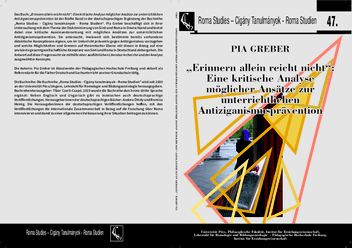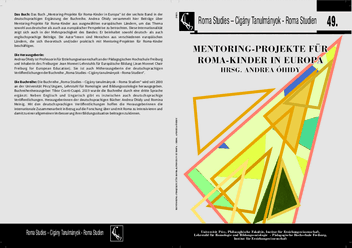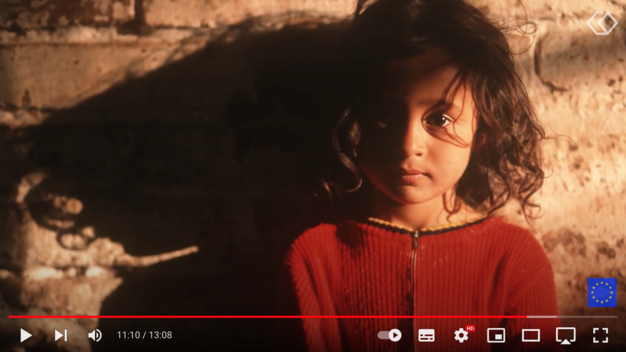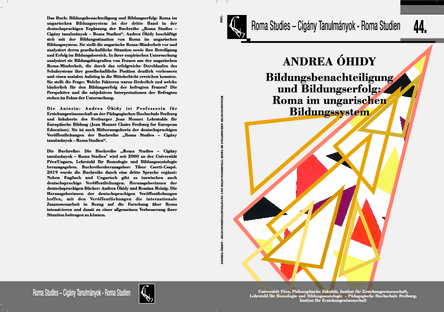
Europeanization of Education
Children´s rights in European education. Dilemmas, challenges and implementation regarding Roma children
(Andrea Óhidy, Sheila Riddell and Alina Boutiuc-Kaiser)
The UN Convention on the Rights of the Child (UNCRC) recently had its 30th anniversary. Emerging from the United Nations General Assembly in 1989, it has since become the most ratified international human rights treaty ever. Most of the European countries ratified the UNCRC and are thus obliged to ensure the implementation of children’s rights in practice. Operationalizing the UNCRC raises practical, conceptual and ethical issues. For example, questions arise concerning children and young people’s capacity and competence to make autonomous decisions in different social domains, esp. in education. There are also debates about children’s involvement in dispute resolution and the extent to which rights must always be associated with redress in order to make them meaningful. Clearly, the relationship between the rights of children and young people on the one hand and those of parents on the other, are particularly salient. In addition, challenges may arise in relation to children from the Roma-minority, for example in educational institutions. Although Article § 28/1 of the UNCRC stresses that “State Parties recognize the right of the child to education, and with a view to achieving this right progressively and on the basis of equal opportunity”, Roma students usually suffer in educational institutions from multiple deprivation. There have been different rates of progress across Europe in terms of incorporating aspects of the UNCRC into domestic law and putting it into practice in schools and other education institutions.
Contributors draw on different disciplines and research traditions (Law, Psychology, Sociology, Social Policy and Education Sciences) in different European countries (Czech Republic,ireland, Scotland and Germany). Questions addressed by contributors include the following:
- What rights have been accorded to children and young people in different social policy arenas and European jurisdictions?
- What are and should be the roles of the state, parents and children?
- What challenges arise when translating policy rhetoric on Roma children’s rights into meaningful action on the ground?
- For the next 30 years, what dilemmas may arise in relation to Roma children’s rights? What are the potential solutions?
Articles:
Andrea Óhidy, Sheila Riddell & Alina Boutiuc-Kaiser: Children's rights in European education. Dilemmas, challenges and implementation regarding Roma children in selected European countries – An introduction
Markéta Levínská & Dana Bittnerová: Social Justice in Education from the
Perspective of the Roma in the Czech Republic - A Case Study
Sheila Riddel: The Rights of Children from Gypsy/Traveller and Roma Backgrounds in
Scotland
Cognard Gaëtan: The rainbow shamrock
Alina Boutiuc-Kaiser: 30 years of United Nations Convention on the Rights of
the Child in Germany
Navigating educational trajectories and transitions: A qualitative systematic literature review on international STEM doctoral students (Alina Boutiuc-Kaiser)
To date, much of the research on international science, technology, engineering, and mathematics (STEM) doctoral students has focused either on international academic mobility or on students’ acculturation and adjustment challenges and coping mechanisms in foreign academic contexts. In comparison, very little attention has been paid to Asian doctoral students and their personal experiences from a life course perspective.
Based on a qualitative literature review, this article sheds light on the experiences of Asian doctoral students in STEM (science, technology, engineering, and mathematics) disciplines within a life-course theoretical approach, paying particular attention to their agency, socialisation, and educational trajectories and transitions. The process of migration/mobility and transition between academic institutions requires a reassessment of cognitive patterns, behaviours, learning mechanisms, and the exercise of agency and response. The findings highlight how the complex dynamics between agency, socialisation, cultural norms and values, economic factors, academic performance, and institutional parameters influence the educational trajectories and transitions of Asian STEM doctoral students abroad. The result contributes to a synthesis of research findings that could inform doctoral education policy.
Intercultural Education (esp. Multilingual Education) in Europe
Multilingualism in Europe (Krisztina Sebestyén, Katarzyna Jagielska & Nadine Comes)
20 years ago, in 2002, prime ministers and head of states decided, that all people in the European Union should know two other, foreign languages beside of the mother language (Kommission der Europäischen Gemeinschaften 2005). Since that, the foreign language teaching and learning changed a lot, and the foreign language knowledge is one of the basic competences nowadays e. g. in education or labour market. But the foreign language knowledge of the European people is very different – that means level and languages as well. Furthermore, the good foreign language knowledge means not only the language knowledge (grammar, pronunciation, vocabulary etc.) but cultural information too. The cultural knowledge helps to interpret different situations on other foreign languages, and it takes better the foreign language knowledge. These are the start points of the thematic issue, in that there are theoretical and empirical papers about the foreign language teaching, learning and interesting about culture in foreign languages. Contributors to the thematic part of this special issue draw on different disciplines and research traditions among the following questions:
- How can we interpret constructivism in 21st century’s teaching / learning environment?
- How can we interpret and adapt in classrooms the theory of tertiary language didactics?
- How can we help interpretation of literary texts to develop students’ discourse competence?
- How can we realize the multilingualism in the Lithuanian educational institutions?
- How can we interpret the Reading and Mathematics competency results of students with learning disorder / integration, learning and behavioural difficulties in classes with special language curriculum?
- How can we recognize foreign students the Hungarian culture with help of museums?
Articles:
Sebestyén, Krisztina; Jagielska, Katarzyna & Comes, Nadine: Multilingualism in Europe among to some theoretical and empirical examples – Introduction to a thematic issue
Sarah Dietrich-Grappin & Britta Hufeisen: Tertiary language didactics 2.0 • A review of a multilingual didactics approach and its remodeling in the light of empirical research, translanguaging and compétence plurilingue
Tatiana Lașcu: Development of the discourse competence through literary texts
Jurgita Lenkauskaitė &Daiva Malinauskienė: Multilingualism in Lithuanian pre-school education institutions: Situation, issues, prospects
Roland Hegedüs & Krisztina Sebestyén: Focus on 10th grade students with learning problems: What influences their achievements?
Zum Video
Teaching and Learning in a Globalized Classroom - a Concept for University Didactics (Alfred Holzbrecher & Patrick Blumschein)
This paper presents a concept for university didactics realized within the EU-funded Jean Monnet Chair Freiburg for European Education (JMC-FrEE) at the University of Education in Freiburg (Pädagogische Hochschule Freiburg). One of the main objectives of the JMC-FrEE-project is to provide expert guidance to future educators and teachers about European matters, and to prepare them to organize learning and teaching processes in a European context for the education of the next generation of active European citizens. This didactic concept show possible perspectives how teacher education can find answers to the outlined challenges.
Education for disadvantaged children (esp. from the Roma-minority) in Europe
Bildungsbenachteiligung und Bildungserfolg: Roma im ungarischen Bildungssystem (Andrea Óhidy)
In ihrem Buch "Bildungsbenachteiligung und Bildungserfolg: Roma im ungarischen Bildungssystem" beschäftigt sich Andrea Óhidy mit der Bildungssituation von Roma im ungarischen Bildungssystem. Sie stellt die ungarische Roma-Minderheit vor und analysiert deren gesellschaftliche Situation sowie ihre Beteiligung und Erfolg im Bildungsbereich. In ihrer empirischen Untersuchung analysiert sie Bildungsbiografien von Frauen aus der ungarischen Roma-Minderheit, die durch das erfolgreiche Durchlaufen des Schulsystems ihre gesellschaftliche Position deutlich verbessern und einen sozialen Aufstieg in die Mittelschicht erreichen konnten. Sie stellt die Frage: Welche Faktoren waren förderlich und welche hinderlich für den Bildungserfolg der befragten Frauen? Die Perspektive und die subjektiven Interpretationen der Befragten stehen im Fokus der Untersuchung.
Video: https://youtu.be/npPA8TS3BxE
Erinnern allein reicht nicht: Eine kritische Analyse möglicher Ansätze zur unterrichtlichen Antiziganismusprävention (Pia Greber)
In ihrem Buch: „Erinnern allein reicht nicht: Eine kritische Analyse möglicher Ansätze zur unterrichtlichen Antiziganismusprävention" beschäftigt sich Pia Greber mit dem Thema der Diskriminierung von Sinti und Roma in Deutschland. Sie bietet dabei eine kritische Auseinandersetzung mit möglichen Ansätzen zur unterrichtlichen Antiziganismusprävention und untersucht, inwieweit sich bestimmte bereits vorhandene didaktische Konzeptionen eignen, um im Unterricht präventiv gegen Antiziganismus vorzugehen und welche Möglichkeiten und Grenzen auf theoretischer Ebene mit diesen in Bezug auf eine anvisierte gesamtgesellschaftliche Akzeptanz von Sinti und Roma in Deutschland einhergehen. Die Antwort auf diese Fragen sucht sie mithilfe einer ausführlichen Literaturrecherche und der Analyse ausgewählter Konzepte.
Video: https://youtu.be/iVkylH4RtxQ

Mentoring-Projekte für Roma-Kinder in Europa (Andrea Óhidy)
In ihrem Buch „Mentoring-Projekte für Roma-Kinder in Europa“ versammelt Herausgeberin Andrea Óhidy Beiträge über Mentoring-Projekte für Roma-Kinder aus ausgewählten europäischen Ländern, um das Thema sowohl aus deutscher als auch aus europäischer Perspektive zu betrachten. Diese Internationalität zeigt sich auch in der Mehrsprachigkeit des Bandes: Er beinhaltet sowohl deutsch- als auch englischsprachige Beiträge.
Video: https://youtu.be/dr85Bpj3rHw


Forschung
Die Forschungsaktivitäten des JMC-FrEE-Projektes sind in Übereinstimmung mit den Lehraktivitäten geplant und konzentrieren sich ebenfalls auf die oben genannten drei Bereiche. Es geht um die Förderung, Beratung und Betreuung einer jungen Forscher*innen- und Lehrer*innengeneration auf verschiedenen akademischen Ebenen (BA, MA, Doktorat und Postdoktorat) im Bereich EU-Studien, insbesondere im Themenbereich „Europäische Bildung“. Studierende in jeder Phase ihres Studiums (insbesondere Doktorand*innen) und Lehrer*innen können partizipieren unter Anleitung des JMC-FrEE-Teams. Ein besonderer Schwerpunkt liegt auf der Erforschung europäischer Fragen im Bereich der Schulbildung.



